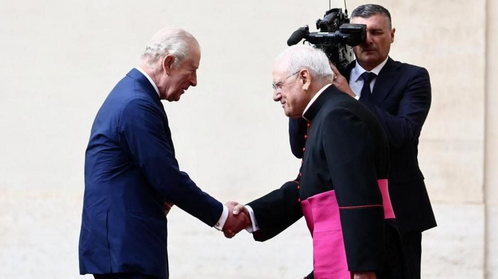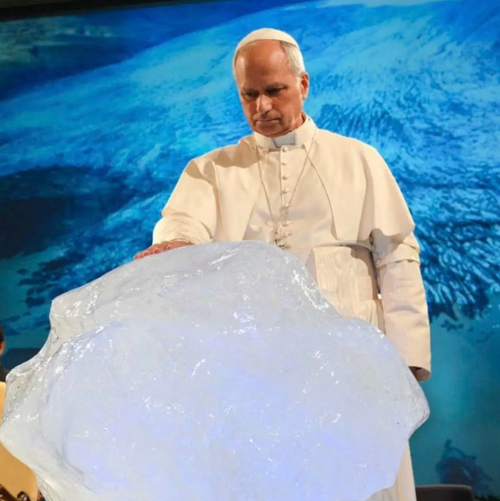October 23rd, 2025
by Zach Terry
by Zach Terry
Paving the Way of Anti-Christ
King Charles III and Pope Leo XIV praying together in the Vatican may be far more significant than we know.
I write this post 34,000 feet over the Atlantic Ocean as I return with a group of friends from a Church History Tour of England and Scotland. Perhaps that's why I was alarmed by the news I saw this morning on the BBC. Earlier today, October 23, 2025, King Charles III arrived in Vatican City, marking a groundbreaking moment: the first reigning English monarch in nearly 500 years to publicly pray with a pope. This event, unfolding amid calls for global unity, bridges centuries of division. Yet, it also prompts reflection on how personal ambitions and shared causes can reshape faith and power.

The Tudor Spark: Henry VIII and the Birth of Anglicanism
Nearly five centuries ago, a king’s clash with the papacy ignited the Church of England, forever altering the spiritual landscape of the Western world. In 1534, Henry VIII’s request for an annulment from Pope Clement VII was denied, turning a personal crisis into a theological revolution. The Protestant Reformation was already sweeping Europe, and Henry’s inner circle— a 16th-century dream team—fueled the flames.
Thomas Cranmer provided the theological backbone, crafting biblical arguments for royal supremacy. Thomas Cromwell drove the legislation, making the monarch head of church and state. Stephen Gardiner offered legal finesse, framing rebellion as orthodoxy. Edward Foxe rallied European academics for intellectual support. And Hugh Latimer, from the pulpit, stirred the masses, portraying the crown’s cause as divine will. Together, they blended politics, law, theology, and persuasion, transforming England’s church from a papal outpost into a national “super-church”—Anglicanism—rooted in royal authority and English identity.
Thomas Cranmer provided the theological backbone, crafting biblical arguments for royal supremacy. Thomas Cromwell drove the legislation, making the monarch head of church and state. Stephen Gardiner offered legal finesse, framing rebellion as orthodoxy. Edward Foxe rallied European academics for intellectual support. And Hugh Latimer, from the pulpit, stirred the masses, portraying the crown’s cause as divine will. Together, they blended politics, law, theology, and persuasion, transforming England’s church from a papal outpost into a national “super-church”—Anglicanism—rooted in royal authority and English identity.
From Imperial Rome to Reformation London
In the fourth century, Christianity shifted from Jerusalem’s humble origins to Rome’s imperial grandeur. Twelve centuries later, the Protestant Reformation cracked that foundation, as believers sought footing in Scripture and conscience rather than empire or papacy. Henry VIII’s quest for remarriage created the opening, channeling Reformation ideas from Geneva to London—a new hub of Protestant influence.
The Climate Catalyst: A New Common Ground
Yet, in recent days, something has changed. Something has brought the two Romes—and the heads of the two once-divergent churches—together again. The driving force, it seems, is not doctrinal reconciliation nor a shared vision for revival, but rather a common cause: climate change. Both King Charles and Pope Leo have long championed environmental stewardship as a moral issue. The Pope recently offered his “blessing” to a massive block of ice—a gesture meant to highlight melting glaciers and the urgency of global warming.

Yet, this alliance raises questions. Is it another step toward genuine revival, as many of us have prayed for, after the tragic assassination of Charlie Kirk on September 10, 2025? In my view, this move stems from a different place—not primarily from bowing to the Creator, but from bowing to the creation itself.
Prophetic Warnings: Toward a One-World Order
Scripture foretells a one-world government, requiring a common enemy to unite nations (Revelation 17-18). For a time, the global pandemic served that role, enabling coordination and control. Now, as COVID fades, climate change re-emerges as a border-crossing narrative, bridging even confessions and creeds.
This Rome-London convergence, once divided by theology, now unites under ideology—a poignant irony. It may pave the way for broader realignments, drawing in other faiths toward what the Apostle John described as “Babylon the Great”: a fused system of religion, economy, and power, culminating in the Antichrist’s rise.
What does this mean for believers today? Return to the Word, pray for discernment, and engage faithfully. The world as we know it will one day be burned down to its very elemental structure. Peter wrote:
This is not a poetic metaphor—it is a divine warning. God will purify creation by fire just as He once judged it by water. The faithful response is not panic but spiritual preparation:
Join the discussion in the comments—share your thoughts on this historic moment and its implications. Learn more about what the Bible teaches regarding the end of the age at ZachTerry.com.
This Rome-London convergence, once divided by theology, now unites under ideology—a poignant irony. It may pave the way for broader realignments, drawing in other faiths toward what the Apostle John described as “Babylon the Great”: a fused system of religion, economy, and power, culminating in the Antichrist’s rise.
What does this mean for believers today? Return to the Word, pray for discernment, and engage faithfully. The world as we know it will one day be burned down to its very elemental structure. Peter wrote:
“The day of the Lord will come like a thief, and then the heavens will pass away with a roar, and the heavenly bodies will be burned up and dissolved, and the earth and the works that are done on it will be exposed.” — 2 Peter 3:10
This is not a poetic metaphor—it is a divine warning. God will purify creation by fire just as He once judged it by water. The faithful response is not panic but spiritual preparation:
“Since all these things are thus to be dissolved, what sort of people ought you to be in lives of holiness and godliness, waiting for and hastening the coming of the day of God.” — 2 Peter 3:11–12
Join the discussion in the comments—share your thoughts on this historic moment and its implications. Learn more about what the Bible teaches regarding the end of the age at ZachTerry.com.
The Maximum Life Blog
My name is Zach Terry. The thoughts and opinions expressed in this blog are my own, with occasional interjections from my bride of nearly 25 years, Julie. This format of publication is meant to allow for engagement and interaction. Feel free to comment. But please, be nice.
Recent
Archive
2026
January
Cleansing the PalateThe Library of MankindSuch a Strange Way to Save the WorldLoved Like RachelCode Red | From the Army to Audiobooks — Faith, Literature, and the Making of a Voice ActorConverts and ConflictMaids and Mandrakes: Dysfunction, Departure, and Divine Grace in Genesis 30The Importance of Children's Theology BooksDealing with a Narcissist
2025
February
March
July
August
September
October
Why We Should Bless IsraelGovernment Shutdowns and God’s Blueprint for Smaller GovernmentCompassion and ConsequencesSodom, Netflix, and the Two Paths Before UsRevival Isn’t a Rumor — It’s HappeningIt’s Time to Stop Playing It SafeA New Door OpensPreach the Word. Show Your Hand.When “Love Your Neighbor” Becomes a WeaponA New Day DawningPaving the Way of Anti-ChristThe Church and the Honky-TonkMy Personal Position on Israel
November
2024
April
May
No Comments